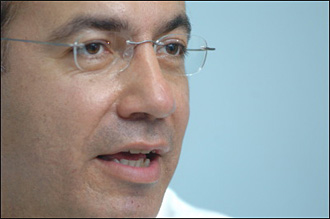 |
 |
 |
 Editorials | October 2007 Editorials | October 2007  
Calderon Rides Popularity Wave Towards Reform
 Carlos Luken - MexiData.info Carlos Luken - MexiData.info
go to original


| | Many Mexicans see President Calderon as a vigorous and talented politician; a leader who has managed significant advances barely nine months into his term. |
In July 2006, Felipe Calderon squeezed into the Mexican presidency after winning by less than 1 percent over his closest opponent, Andres Manuel Lopez Obrador (AMLO).

Although Mexico’s electoral courts upheld Calderon’s slim margin victory, AMLO’s ensuing charges of fraud, massive street demonstrations, and the follow-on melee during the December 1 inauguration were ominous signs for the incoming Calderon administration.

As well, the election results made AMLO’s Party of the Democratic Revolution (PRD) a force to be reckoned with, as it became the second power in the 500 member lower house of Congress with 153 deputies (the National Action Party, or PAN, has 206 deputies).

But what a difference a year makes!

After six months, PRD activism and its stubborn congressional antics discouraged many followers who reversed themselves and withdrew their support in 2007 state and local elections. After getting 34% of the national vote in 2006, this year the PRD has had marginal results, losing its prominent position with as little as 3% of the vote in some states.

The PRD has also been rocked by power struggles, with AMLO’s cohorts making brazen attempts to seize the party presidency over fundamentalists. AMLO has also made regrettable blunders in bullying PRD congressmen to vote or block initiatives, and some resent his interference.

As a result the PRD is a fractured party, with significant grassroots splits and a massive loss in popularity.

Paradoxically, many Mexicans now see President Calderon as a vigorous and talented politician; a leader who has managed significant advances barely nine months into his term.

In this short time Calderon has waged all-out war against the drug cartels, shunning controversy by using the Mexican Army as an enforcement arm while overhauling notoriously corrupt civilian police agencies. He has also confirmed his reputation as a mediator, by making congressional alliances with political opponents from the Institutional Revolutionary Party (PRI) in order to gain the necessary votes to pass key legislation.

A savvy politician, he is keenly aware that his public image may be his greatest advantage, or as in the case of his predecessor, Vicente Fox, his biggest obstacle.

Calderon is a staunch disciplinarian who runs his administration with a tight reign, and publicly to date there have been no dissenting voices from within his cabinet. Unlike many of his predecessors, Calderon rarely uses spokespersons to communicate as he frequently addresses the nation directly. Few Mexicans doubt that it is Calderon who runs his government, although he is not perceived as an Imperial President, which was the case during seven decades of autocratic PRI rule.

Calderon’s canceling his schedule during last summer’s US-Canada-Mexico summit, to hastily fly to Mexico’s hurricane-torn Caribbean states and directly take charge of the rescue and recovery operations, was well received by a population that has long resented most politicians’ abandonment in favor of more grandiose causes.

Upon taking office, and recognizing the public feelings that supported AMLO’s candidacy, Calderon drew from his opponent’s agenda and made community concerns priorities of his government. And he did so by veering toward popular social issues without AMLO’s populism.

Calderon has been cautious not to repeat one of Fox’s major PR mistakes. Although his wife, Margarita Zavala, is an intelligent and discreet person – a lawyer and former congresswoman, the “presidential couple syndrome” that hurt Fox has been prudently avoided.

In an effort to overhaul the PAN hierarchy, Calderon has accepted the resignation of his friend German Martinez, a cabinet member and one of his closest allies. Martinez will run for the presidency of PAN next year, taking on the current president, Manuel Espino, who is expected to seek reelection.

Espino is perceived as a conflict-ridden chief, and he is blamed for alienating a party organization that has had few election victories and many rivalries.

Martinez, a centrist, is one of the PAN’s rising stars. Intelligent and a skilled negotiator, he is well suited for the task. And should he win, he may prove to be instrumental in revamping the party in such a way as to take advantage of congressional opportunities in the 2009-midterm elections.

Sensing the favorable mood towards him, and the PRD’s dwindling numbers, Calderon is making a bold move. Although his congressional alliance with the rival PRI has yielded a moderate working relationship and majority, the arrangement at best is tentative. Calderon is hoping that his reputation, and the PRD’s loss in popularity, may allow a Martinez run PAN to gain a 2009 congressional clear majority so as to approve vital legislative reforms in 2010.
Carlos Luken, a MexiData.info columnist, is a Mexico-based businessman and consultant. He can be reached via e-mail at ilcmex@yahoo.com. | 
 | |
 |



